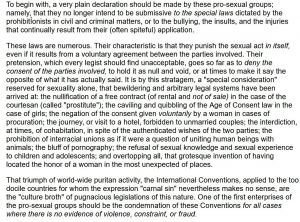Sexceptionalism

Sexceptionalism is the treatment of sexuality as an area of special interest, particularly with respect to laws against consensual/voluntary "sex acts" (queer sexuality). Scholars have questioned why, for example an array of sex laws are required when existing laws against assault could be used. Some have concluded that this form of antisexual exceptionalism has evolved as a convenient tool to distract the populace and service elite interests by creating divisions and culturally contentious narratives. In this sense, restrictions on sexual expression have infected the state/public life as the influence of religion and cultural/family values has slowly waned.
Quotes
- "It is ordinarily said that criminal law is designed to protect property and to protect persons, and if society’s only interest in controlling sex behavior were to protect persons, then the criminal codes concerned with assault and battery should provide adequate protection. The fact that there is a body of sex laws which are apart from the laws protecting persons is evidence of their distinct function, namely that of protecting custom."[2]
Scott De Orio:
- "The sex-specific nature of sex crime law enshrines the assumption that sex is something that is uniquely harmful, rather than a key aspect of human flourishing, [and] contributes to the stigmatization and demonization of sex itself as well as to the repression of benign sexual variation. “Sex” is not a synonym for “harm,” and the law should not treat it as such."[3]
The disciplinary function of RSO Laws
It has been suggested that RSO (Sex Offender Registration) laws and restrictions serve as a way of disciplining the "special" offender and providing a narrative social routine for the internalization of "sexual offending" exceptionalism by society at large. As a result, the disciplinary scheme routinizes and renders banal, the idea that offenders who subvert the public morals should be treated as more dangerous than con artists or violent psychopaths for example.
By acting as a "second layer" of disciplinary action on top of the sexual offending legal scheme, RSO Laws force individuals (for example, American SOL Reform activists) to invest time and energy into challenging their second-class status as opposed to the basis for punishing often consensual crimes in the first instance.
See also
Quotes
- ↑ Human rights and the denial of sexual freedom
- ↑ Kinsey, A. Sexual Behavior in the Human Male (1948), p4
- ↑ De Orio, Punishing Queer Sexuality in the Age of LGBT Rights (2017), p302